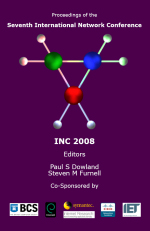In 2014, we launched our open-access repository which offers full text access to conference proceedings from many of our events including the INC and HAISA series. These papers are free to access and distribute (subject to citing the source).
» Openaccess proceedings » Seventh International Network Conference (INC 2008)
 | Seventh International Network Conference (INC 2008) |
Title: Scalability Issues with the Hierarchical Feedback Aggregation for Large-Scale IPTV Systems
Author(s): Dan Komosny, Ganeshan Kathiravelu, Mojmir Jelinek, Radim Burget
Reference: pp15-26
Keywords: Multicast, Feedback, Hierarchical Tree, IPTV
Abstract: Hierarchical feedback aggregation is an enhancement to the RTP/RTCP (Real Time Protocol/Real Time Control Protocol) when the SSM (Source-Specific Multicast) is employed. The main purpose of feedback transmission is to provide information about media delivery and information needed for RTP/RTCP session management. This paper deals with a tree structure for hierarchical feedback aggregation specifically designed for use in large-scale IPTV systems. This tree consists of end nodes and feedback targets. A feedback target collects feedback from a group of nodes, which are either end nodes or other feedback targets. The feedback gathering process continues up to the main feedback target, which is the top of the tree. The maximum number of nodes below a feedback target in the tree hierarchy should be known in order to avoid overloading the feedback target. For the purpose of estimating this maximum number, we used PlanetLab. The use of PlanetLab allowed us involving many more nodes spread around the globe in measurement. Finally, we propose the maximum recommended number of nodes below a feedback target in the tree hierarchy.
Download count: 1467
How to get this paper:


PDF copy of this paper is free to download. You may distribute this copy providing you cite this page as the source.
